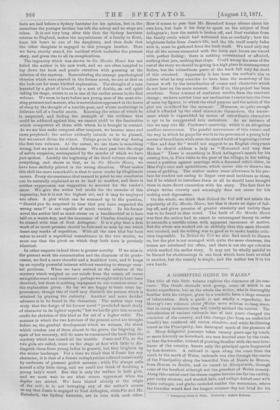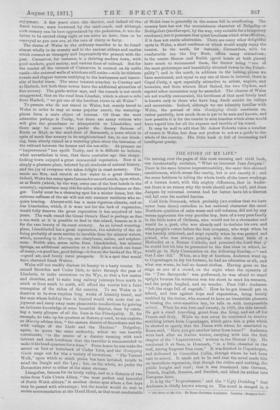A GOSSIPPING GUIDE TO WALES.*
THE title of this little volume explains the character of its con- tents. The Guido abounds. with gossip, some of which is no doubt superfluous, but on the whole the writer, who is thoroughly familiar with his subject, gives in a readable form a largo amount of information. Such a guide is not wholly a superfluity, for Murray's two volumes about jWales were written so long since, that in many instances they will totally mislead the tourist. The introduction of various railroads has of late years changed the character of the country, and this change (far from an undivided benefit) has rendered old routes obsolete, and while facilitating travel in the Principality, has destroyed much of the pleasure of it. Many delightful journeys taken twenty years ago by coach, or more leisurely on horseback, are now hurried over by the train, so that the traveller, instead of growing familiar with the rare love- liness of the country, knows only the principal spots frequented by lion-hunters. A railroad is open along the coast from the south to the north of Wales, railroads run also through the centre of the Principality along the beautiful Vale of Neath to Brecon, from Brecon to Builth, and so round to Aberystwith, through some of the loveliest although not the grandest of Welsh scenery. Along this central road the steam-engine hurries one far too swiftly, past rocky streams, amid wooded hills, and valleys dotted over with white cottages, and glades secluded amidst the moutitains, where the traveller would find the longest summer day too brief for his Goasippirkg Guide to Wales. 0owestry: askew Roberts,
enjoyment. A few years since this district, and indeed all the finest routes, were traversed by the mail-coach, and although i
such scenery can be best appreciated by the pedestrian, t was far better to be carried along eight or ten miles an hour, than to be conveyed as you now are, at the rate of thirty or forty.
The charm of Wales to the ordinary traveller is to be found almost wholly in its scenery and in the ancient abbeys and castles which connect so strangely and impressively the present with the past. Cianarvon, for instance, is a thriving modern town, with good markets, good society, and various lines of railroad. But for the tourist all the interest of Carnarvon is centred on its noble castle—the external walls of which are still entire—with its thirteen towels and elegant turrets testifying to the lawlessness and insecu- rity of feudal times. The same interest attaches to Conway and to Harlech, but both these towns have the additional attraction of fine scenery. The guide-writer says, and the remark is not muoh exaggerated, that on the road from Llanfair, which is about a mile from Harlech, " we get one of the loveliest views in all Wales."
To persons who do not travel in Wales, but merely travel to 1Vales in order to stay at some popular resort, the watering- places form a main object of interest. Of these the most attractive perhaps is Teuby, but there are many visitors who will give the precedence to Aberystwith or Llandudno, and there may be some who prefer the dreary flatness of Borth or Rhyl, or the sand-dust of Barmouth, a town which in spite of rnuoh fine scenery in its neighbourhood has, to our think- ing, been utterly ruined as a watering-place since the intrusion of the railroad between the houses and the sea-side. At present no 4 4
improvement" has spoilt Teuby, and it is difficult to believe, what nevertheless is true, that three centuries ago this sleepy- looking town enjoyed a great commercial reputation. Now it is simply a pleasure place, beloved by all students•of natural history, and the joy of everyone who takes delight in coast scenery. The sands are firm, and stretch at low water to a great distance ; indeed, Wales has many spots famous for smooth sands, upon which, as at Borth (which, by the way, owns one of the best hotels in the country), equestrians may ride for miles without hindrance or dan- ger. Tenby must be a charming spot for a winter home, but the extreme softness of the air will not suit summer residents who re- -quire bracing. Aberystwith has a more vigorous climate, and so has Llandudno, which, if it were not for the lack of vegetation, would fully deserve the great reputation it has acquired of late years. The walk round the Great °rifle's Head is perhaps as fine a sea-walk as it is possible to find in this island, famous as it is for the rare beauty of its coast scenery. As an inland watering- place, Llandrindod has a great reputation, the salubrity of the air being probably of more service to invalids than the mineral waters, which, according to Murray, are chalybeate, saline, and sulphur- eons. Builth also, seven miles from Llandrindod, has mineral springs, an additional attraction to a little place which can boast of many, —a good inn, good fishing—it lies on the banks of the Wye —good air, and lovely rural prospects. It is a spot that would have charmed Izaak Walton.
Wales will not readily disclose its beauty to a hasty tourist. To ascend Snowdon and Cader Idris, to drive through the pass of Llanberis, to make excursions on the Wye, to visit a few castles and churches, and to make long railway journeys from north to south or from south to north, will afford the tourist but a faint -conception of the riches of the country. To see Wales as it deserves to be seen requires long weeks of leisurely travel, and the man whose holiday time is limited would win more real en- joyment and carry away more pleasurable recollections by gaining an intimate knowledge of some beautiful district, than by catch- ing a hasty glimpse of all the lions in the Principality. If, for example, he take up his quarters at Bettws-y-coed, he can explore, as Murray advises him, "the eastern district of Snowdonia and the wild valleys of the Lledr and the Machno." Dolgelley,
again, to quote the same authority, which we can heartily corroborate, "is the centre of a district teeming with such interest and such loveliness that the traveller is recommended to
make it his head-quarters for a time." From hence he can make the ascent on foot or horseback of Cader Idris, and the Gossipping Guide maps out for him a variety of excursions. "The Torrent Walk," upon which so much praise has been lavished, recalls to mind the Dargle and the Lyn; but, on the whole, we prefer the Devonshire river to either of the sister streams.
Llangollen, famous for its lovely valley, and at a distance of two miles from Valle Crucis Abbey, "the most perfect and beautiful of North Welsh abbeys," is another choice spot where a few days may be passed with advantage ; but the tourist would do well to secure accommodation at the Hand Hotel, as that most comfortable
of Welsh inns is generally in the season full to overflowing. The scenery here has not the mountainous character of Dolgelley or Beddgellert (another spot, by the way, very suitable for a temporary residence), but it possesses that quiet loveliness which wins affection, if it does not excite admiration. There are many other delightful spots in Wales, a short residence at which would amply repay the tourist. In the south, for instance, Carmarthen, with its comfortable inn the Ivy Bush, offers many attractions ; in the centre Brecon and Builth (good hotels at both places) have much to recommend them, the former being "one of the most picturesque and beautifully situated towns in the Princi- pality "; and in the north, in addition to the halting-places we have mentioned, and equal to any one of them in interest, there is Capel Curig, a spot especially attractive to artists, anglers, and botanists, and from whence Mod l Siabod, the two Glyders, and seyeral other mountains may be ascended. The charms of Wales are not readily enumerated, the loveliness of that most lovely land is known only to those who have long dwelt amidst its valleys and mountains. Indeed, although we are tolerably familiar with Wales, the perusal of this Gossipping Guide convinces us, rather painfully, how much there is yet to be seen and known, and how possible it is for the tourist to miss beauties which alone would have repaid him for all the expense and trouble of his travel.
It may be well to add that Mr. Askew Roberts takes a number of routes in Wales, but does not profess to act as a guide to the whole of the country. His little book is full of interesting and intelligent gossip.































 Previous page
Previous page